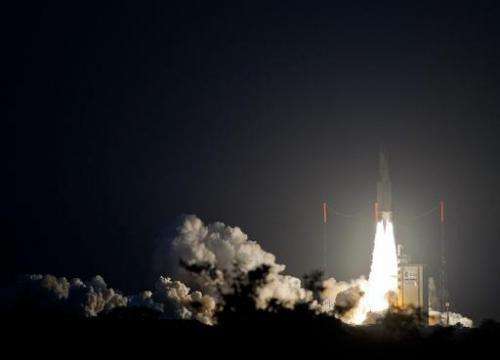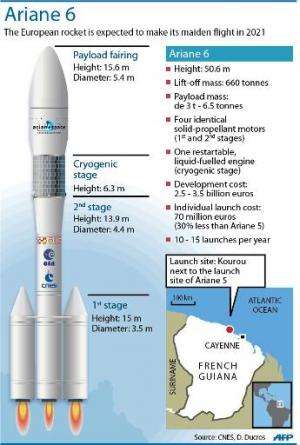Europe's new rocket set for political launch

Members of the European Space Agency (ESA) were hammering out details Tuesday of an eight-billion-euro ($10-billion), 10-year rocket programme with a new Ariane 6 launcher at its heart.
Sources at the talks in Luxembourg, gathering 20 European nations and Canada, said ministers were scrutinising financial aspects before giving the green light to a hard-fought deal.
Intended to have a cheaper, more flexible design, the Ariane 6 will replace Ariane 5—a medium-to-heavy workhorse with 62 successful launches to its name. It accounts for more than half of the world's commercial launch market.
Despite its reliability, Ariane 5 comes with high operational costs that are a drain on ESA's budget at a time of belt-tightening.
"The proposal will give Europe a competitive, flexible Ariane from 2020," France's space minister Genevieve Fioraso said in a speech to ministers.
Fioraso said Ariane 6 also "will respond to the rising threat of a spectacular breakthrough by new players who are weakening our autonomy in this area."
Nimble US commercial competitors such as SpaceX are competing to get into a satellite launch market whose demands have changed dramatically since Ariane 5 was first conceived nearly 30 years ago.
Startup costs for the Ariane 6 are estimated at 3.8 billion euros.
All in all, the meeting is expected to agree to spending of eight billion euros—800 million annually over 10 years—to fund the agency's family of launchers and their infrastructure, including a new launch pad at ESA's base at Kourou, French Guiana.

Tensions
A replacement for the Ariane 5 has been a source of friction for the last two years, with France and Germany—ESA's two biggest contributors—pushing alternative approaches.
Germany argued that a new rocket would require so much time to develop that rivals could have grabbed a fat share of the satellite market by the time it was ready.
It argued for a modified version of the existing rocket—the Ariane 5 ME, for Midlife Evolution—which would be ready by 2017 and yield early operational savings.
France had lobbied for a transition approach to introducing the Ariane 6 from about 2021 or 2022.
It argued the ME would drain crucial resources and lead to duplicated effort and probable holdups.
Under a compromise, the Ariane 6 will incorporate features from the ME and other projects.
It will culminate in two versions—a two-booster or four-booster design—able to take between five and 10 tonnes into orbit.
It will include a solid rocket motor, the P120C, being designed as an upgrade for ESA's Vega launcher, as well as a strap-on booster, but much of the rest will come from the 5.
According to Stephan Israel, head of Arianespace, which markets ESA's services, the current market price for a single launch of two satellites "is around $120 million."
The public face of the wrangle was about different approaches in engineering, driven by arguments of cost overruns and delay.
But an undercurrent was about sharing the funding bounty within Europe's space industry. France and Germany together account for nearly half of ESA's financing for launchers.
In return for Germany's climbdown on the ME, France and Italy are expected to beef up contributions to the International Space Station (ISS). ESA is seeking a three-year 820-million-euro budget for the manned outpost in space.
© 2014 AFP



















